In the fast-paced realm of motorsport, the intersection between media representation and organizational leadership often sparks heated debate. FIA President Mohammed Ben Sulayem has recently voiced strong sentiments regarding his treatment by British media, an assertion that follows comments from renowned engineer Adrian Newey on the “High Performance” podcast. Newey’s remarks not only cast a shadow on the plight of drivers like Max Verstappen and Sebastian Vettel but also serve as a backdrop for Ben Sulayem’s own experiences within the media sphere.
Ben Sulayem’s reflections on the dynamics of media influence unveil a broader discourse on fairness and accountability. He claims that, throughout his presidency, British media has subjected him to undue scrutiny, often framing narratives that paint him in a negative light. His critique suggests a perceived vendetta, where a lack of balanced coverage leads to misrepresentation rather than constructive dialogue. In his candid statements, he describes the media’s relentless focus on him as akin to a conviction without due process—highlighting a troubling trend where sensationalism often trumps journalistic integrity.
In declaring, “they have no power over me and over the FIA,” Ben Sulayem asserts the distinction between media influence and the democratic nature of the FIA’s governance. His emphasis on the essential role of member clubs and the General Assembly in determining leadership serves to remind stakeholders that authority in motorsport does not solely reside with media narratives. In effect, he reclaims his autonomy and positions the FIA as an independent body, suggesting that the media should prioritize the sport’s welfare rather than pursue personal agendas.
While acknowledging the media’s propensity for bias, Ben Sulayem also expresses how these challenges have fostered resilience. His assertion that the scrutiny has “made him stronger” reflects a paradigm where adversity catalyzes growth and cautious pragmatism. Moreover, he sees the evolution of his leadership style as a direct response to these external pressures, suggesting that he is now more vigilant and strategic in navigating the tumultuous waters of media relations.
Ben Sulayem’s contemplation on mutual respect is particularly noteworthy. His admiration for Verstappen, a champion amid controversy, underscores the intrinsic values that bind drivers and leadership alike. Both endure public scrutiny, yet each remains steadfast in their commitment to their respective roles. This parallel between a leader and athletes facing collective challenges can foster a sense of unity in a sport often marred by division.
Assessing the Current State of the FIA
With an eye toward the future, Ben Sulayem is confident that the FIA is more robust now than at the conclusion of 2021, the year he assumed office. His assertion emphasizes a concerted effort to enhance internal efficiencies and foster a culture of responsiveness to member needs. By realigning the FIA’s focus with the core mission of serving its members, he aims to reinforce the federation’s foundation and ensure that it operates as a healthily governed entity—a crucial consideration for stakeholders invested in motorsport’s integrity.
Yet, challenges remain. The automotive landscape is constantly evolving, and the FIA must adapt to these changes while maintaining its core principles. It is imperative for the organization to generate trust amongst teams, sponsors, and fans, fostering an ecosystem where all parties feel valued and heard. Ben Sulayem’s focus on income generation and reform indicates a desire to innovate within the framework of tradition, signaling a proactive approach to governance that seeks to balance heritage with modernity.
Future Aspirations: A Call for Democratic Engagement
Looking ahead, Ben Sulayem is not shy about his ambition for re-election as FIA president. He envisions completing his manifesto with a focus on democratic engagement where every voice matters, asserting “democracy all the time, not part of the time.” This sentiment echoes a broader theme within the sports community, where the essence of governance hinges on transparency, accountability, and active participation from all stakeholders.
In a world where media narratives can sway public perception almost instantaneously, maintaining clarity in communication is paramount. Ben Sulayem’s commitment to steering the FIA through these turbulent waters may yield dividends in building a more cohesive and empowered motorsport community. He poses a challenge to the media as well—a challenge to rise above sensationalism and partake in the constructive dialogue necessary for the sport’s advancement.
As Ben Sulayem navigates a challenging media landscape, his story underscores the crucial interplay between leadership, media representation, and community engagement in motorsport. By advocating for a fairer portrayal of both himself and the athletes he respects, he calls for a collective shift in focus back to the very essence of racing—that of passion, camaraderie, and the relentless pursuit of excellence. Ultimately, it’s not just about the headlines; it’s about ensuring that the spirit of motorsport thrives for generations to come.

